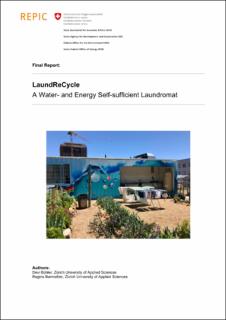Please use this identifier to cite or link to this item:
https://doi.org/10.21256/zhaw-28581| Publication type: | Working paper – expertise – study |
| Title: | LaundReCycle : a water- and energy self-sufficient laundromat |
| Authors: | Bühler, Devi Barmettler, Regina |
| et. al: | No |
| DOI: | 10.21256/zhaw-28581 |
| Extent: | 16 |
| Issue Date: | 7-Jul-2023 |
| Publisher / Ed. Institution: | ZHAW Zürcher Hochschule für Angewandte Wissenschaften |
| Publisher / Ed. Institution: | Wädenswil |
| Language: | English |
| Subjects: | Laundromat; Self-sufficiency; Energy efficiency; Wastewater reuse; Greywater treatment |
| Subject (DDC): | 333: Economics of land and resources 620: Engineering |
| Abstract: | The LaundReCycle project aimed to address water and energy shortages and provide laundry services to communities in Cape Town, South Africa, with limited access to these resources. The project successfully demonstrated the technical feasibility of the LaundReCycle system through pilot tests and adaptations of core technologies. In terms of operational feasibility and acceptance, the pilot plant in Cape Town achieved an energy self-sufficiency rate of 92% and a water self-sufficiency rate of 92%. Only 8% of the water used for washing came from an external supply (tap water), with greywater reuse accounting for 43% and rainwater collection contributing 49%. Expanding the rainwater collection area by just 6m2 could potentially achieve complete water self-sufficiency. The project conducted a survey to assess the acceptance of LaundReCycle in Switzerland and South Africa. South Africans displayed a more positive attitude, with 57% in favour of greywater reuse for laundry compared to 35% in Switzerland. The survey revealed that the positive environmental impact held greater importance than cost savings for users, with the assurance of human health through greywater reuse being a critical aspect. In terms of financial feasibility and business development, the LaundReCycle system generated a total income of 40,000 ZAR from customers utilizing the laundromat services, while costs amounted to 30,000 ZAR. The project also created new jobs and provided training to personnel, contributing to local employment opportunities and skills development. Preparatory work for multiplication and replication involved conducting market surveys and analysing consumer preferences. The project developed a scalable business model and explored financing options for establishing a spin-off organization. Efforts were made to develop a self-sufficient water system capable of addressing larger water challenges. The project's impacts include the installation of 4.32 kWp renewable energy capacity, resulting in the annual production of 7030 kWh of renewable energy and a reduction of greenhouse gas emissions by 3.4 tons per year. The project also saves 25’000 litres of freshwater annually and reduces wastewater discharge by 23’500 litres per year. The project generated economic benefits through third-party funding, local income, and job creation. The next planned steps involve testing the flow-through system in a pilot installation in South Africa and establishing a spin-off company. Efforts will be made to promote multiplication and replication through market development and partnerships with local stakeholders. Lessons learned include the importance of integrating technological and socio-economic perspectives, interdisciplinary collaboration, thorough staff training, and addressing context-specific challenges. The project's findings and recommendations can guide similar projects in maximizing their impact. |
| URI: | https://digitalcollection.zhaw.ch/handle/11475/28581 |
| License (according to publishing contract): | Licence according to publishing contract |
| Departement: | Life Sciences and Facility Management |
| Organisational Unit: | Institute of Natural Resource Sciences (IUNR) |
| Published as part of the ZHAW project: | LaundReCycle South Africa |
| Appears in collections: | Publikationen Life Sciences und Facility Management |
Files in This Item:
| File | Description | Size | Format | |
|---|---|---|---|---|
| 2023_Buehler-Barmettler_REPIC-final-report-LaundReCycle.pdf | 1.28 MB | Adobe PDF |  View/Open |
Show full item record
Bühler, D., & Barmettler, R. (2023). LaundReCycle : a water- and energy self-sufficient laundromat. ZHAW Zürcher Hochschule für Angewandte Wissenschaften. https://doi.org/10.21256/zhaw-28581
Bühler, D. and Barmettler, R. (2023) LaundReCycle : a water- and energy self-sufficient laundromat. Wädenswil: ZHAW Zürcher Hochschule für Angewandte Wissenschaften. Available at: https://doi.org/10.21256/zhaw-28581.
D. Bühler and R. Barmettler, “LaundReCycle : a water- and energy self-sufficient laundromat,” ZHAW Zürcher Hochschule für Angewandte Wissenschaften, Wädenswil, Jul. 2023. doi: 10.21256/zhaw-28581.
BÜHLER, Devi und Regina BARMETTLER, 2023. LaundReCycle : a water- and energy self-sufficient laundromat. Wädenswil: ZHAW Zürcher Hochschule für Angewandte Wissenschaften
Bühler, Devi, and Regina Barmettler. 2023. “LaundReCycle : A Water- and Energy Self-Sufficient Laundromat.” Wädenswil: ZHAW Zürcher Hochschule für Angewandte Wissenschaften. https://doi.org/10.21256/zhaw-28581.
Bühler, Devi, and Regina Barmettler. LaundReCycle : A Water- and Energy Self-Sufficient Laundromat. ZHAW Zürcher Hochschule für Angewandte Wissenschaften, 7 July 2023, https://doi.org/10.21256/zhaw-28581.
Items in DSpace are protected by copyright, with all rights reserved, unless otherwise indicated.